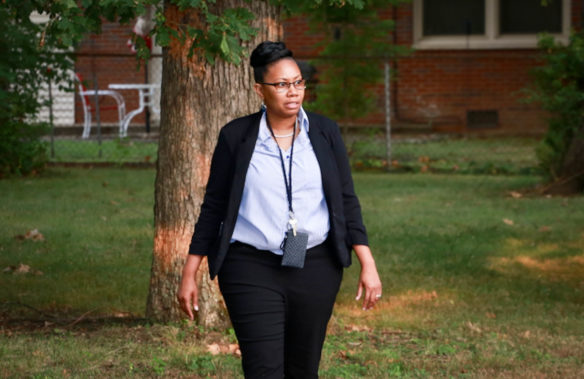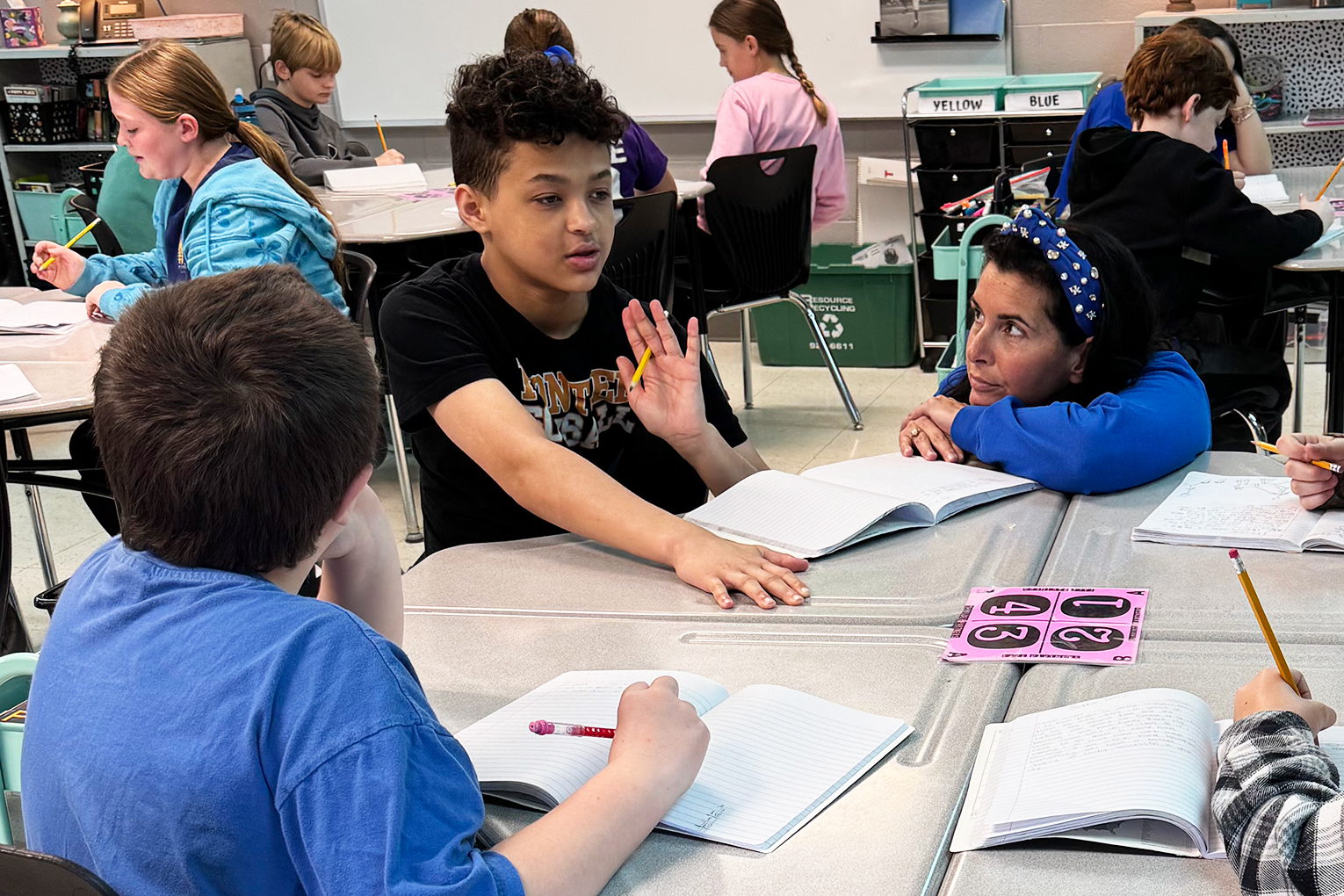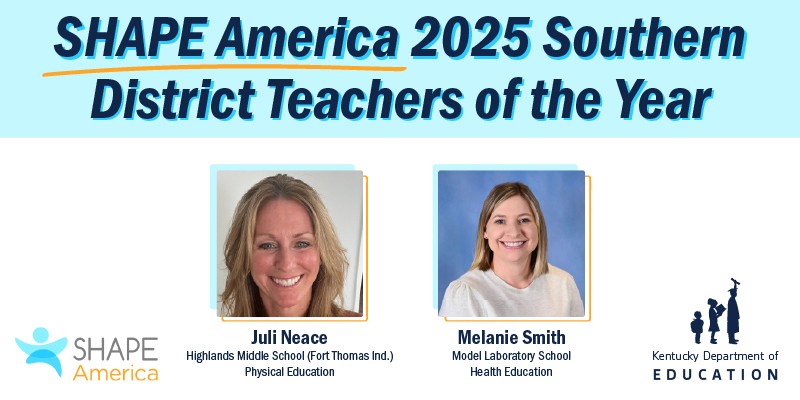
Teresa Spann, the principal at McNabb Elementary School (Paducah Independent), takes a walk around the school grounds. Such walks are among the self-care techniques Spann practices. She said she has come to realize the value of self-care, which can take a number of forms.
Submitted photo by Wayne Walden
By Mike Marsee
mike.marsee@education.ky.gov
Every now and then, Teresa Spann takes a walk.
Spann is responsible for a good many things – and people – in her position as principal of McNabb Elementary School (Paducah Independent). Yet she also makes sure to take a little time to take care of herself.
“What I do if I need a moment and the day’s getting long and hard, I’ll walk the perimeter of the building. I’ll just kind of walk and pray and figure out some things,” Spann said.
Spann has figured out that self-care is essential, even though it’s an area often overlooked by educators as they work to meet the needs of the students they serve. If teachers can carve out a little time for themselves – whether that’s before, during or after the school day – to unplug or meditate or just step away from the stress of their work, they can be better equipped for the challenges they face on a daily basis.
That’s a message that Tim Welsh has been delivering to educators and other audiences for several years. He repeated it this summer at the Persistence to Graduation (PtG) Summit sponsored by the Kentucky Department for Education (KDE), where he has spoken for the past three years.
“In order to not only continue to do this type of work, but to continue to do this work well and to have compassion and be passionate and caring, in order to do any of those things, you have to take care of yourself so you don’t get burned out or suffer from compassion fatigue,” said Welsh, a licensed clinical social worker with Family Health Centers in Louisville. “It’s really kind of an insurance that you can continue to do this work.”
Welsh said he speaks three or four times a year to groups of educators, and he is telling his audiences something they seldom hear.
“Our culture equates self-care to pampering. It’s a luxury. But the purpose of it is to heal and nurture yourself,” he said. “There is a certain belief in our culture that taking care of yourself is a very selfish thing, that we’re supposed to take care of everyone else and just do our job.
“I think a lot of times people who work with other people put their own needs on the back burner. When we do that, eventually we end up in a space where we cannot take care of others well any more.”
Spann said she makes a point of taking care of others, specifically her staff.
“It’s a priority for me, because if our teachers and staff members aren’t healthy and emotionally well, there’s no way they can do what they need to do for our students and our parents,” she said.
“Our mission is to know every child by name, and I also believe in that for my teachers. In the morning, I try to be at the sign-in desk or in the hallway to meet and greet the teachers and just kind of do a self-check to make sure they are mentally well. I also ask questions and keep up with what’s going on in their lives. I’m big on relationships and staying in contact with them, even after school hours, even in the summertime.”
Spann, who is the mother of two teenagers and is taking graduate courses, said she has come to realize that she also needs to carve out some time for herself. She uses that time for exercise, meditation or reading the Bible.
“It’s just who I am,” she said. “I just feel like it’s important for me to start the day with a positive mindset.”
Christina Weeter, the director of KDE’s Division of Student Success, said self-care should be a point of emphasis for educators.
“When we talk about self-care with our own KDE staff, and also with the staff at the schools and districts we support, we often liken self-care to what they tell you on an airplane. In the event the cabin loses pressure, you should put on your own oxygen mask before you assist others. Self-care is the same as putting on your own oxygen mask so you can be effective in helping others,” Weeter said.
Weeter said a lack of self-care has been linked to stress, high staff turnover, professional burnout and workforce attrition. She also said research has shown that attending to self-care can increase professional satisfaction and improve productivity, among other benefits.
“This is one reason why we continue to feature this topic at the PtG Summit, but also because each year the interest grows and it receives some of the highest ratings of all of the sessions offered,” she said. “We are trying to model self-care at KDE the same way we encourage educators to incorporate it into their lives. It’s common to see KDE staff taking short walking breaks throughout the building, and our team has recently started sharing some of our self-care practices with teammates during staff meetings to help integrate it into our work.”
Welsh’s presentation at the summit was subtitled, “How White Castle Saved My Life.” He told his audiences how he squeezed a daily trip to White Castle into his 30-minute lunch break during a time when he wasn’t taking good care of himself.
“White Castle was the perfect distance away. I could get there, order food, sit in my car and eat it while listening to relaxing music and get back to work,” he said. “Now it’s a very infrequent self-care method because I have other ones in place, but at the time it was truly a lifesaver.”
Educators can’t typically leave their campus for lunch, but Kerry Moeykens, a teacher in the Transformational Learning Center alternative program for the Covington Independent schools, said lunch is still an important part of her self-care routine.
“One of the big things I do for myself is I bring an actual plate with silverware to eat my lunch off of,” Moeykens said. “If my lunch is a frozen dinner or leftovers from the night before, it’s important to me to have that plate, and that’s something real simple.”
Spann said she tries to make sure her teachers have “safe places” where they can go if they’re affected by something beyond the stress of a normal school day.
“I make sure that there are places in the building that the teachers can go to if, for instance, they have a loved one that died or a sick child, or if they have to deal with a traumatic experience with a student,” she said.
More structured daily or weekly self-care activities can take the form of physical activity, reading or just relaxing in a quiet room. Welsh said no matter what works for a particular teacher, it’s important to make it a habit.
“Unless you plan it into the day and it’s something you think about, you don’t do it,” he said. “If it’s not part of your life and part of your lifestyle, then it does not happen or it happens so infrequently that it’s not effective. It doesn’t do what it’s supposed to do, which is not just to alleviate a little bit of stress every once in a while, but to ensure that your stress doesn’t get to a point where it’s affecting your physical health or your mental health or your emotional health.”
MORE INFO …
Teresa Spann teresa.spann@paducah.kyschools.us
Kerry Moeykens kerry.moeykens@covington.kyschools.us
Christina Weeter christina.weeter@education.ky.gov




Leave A Comment